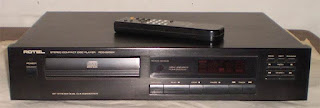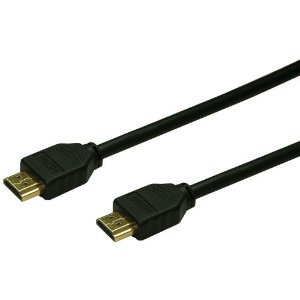Do expensive HDMI cables matter?
Having been on the hunt for a new CD player (yes some people still listen to CDs!), I did the usual browse of hi-fi magazines and websites to help guide me towards what might be an improvement over my 18 year old Rotel.
That said, it is becoming increasingly difficult to trust any review when some magazines describe a £300 HDMI cable as sounding 'controlled and composed'.
This is a cable that carries a digital signal - digital meaning 1's and 0's. By that logic, a more expensive ethernet cable linking your personal computer to a network should also result in a more 'controlled and composed' internet experience. It won't.
In the digital domain, the correct information is either received or it isn't. I have been unable to find any scientific evidence suggesting that a difference in picture quality can be detected between an HDMI cable costing £20 or £200. What I have found is a lot of anecdotal evidence from people who have invested in these cables. See cognitive dissonance and/or the placebo effect.
Surely if a company wants to sell a cable for £200 - they would do well to demonstrate scientifically that it will deliver something? If hair conditioner costing a couple of pounds can manage that - surely an expensive HDMI cable can do the same.
Of course the companies that manufacture these cables can't, because it [*probably] won't show the desired result. Instead they are forced to rely on claims and awards by publications that repeatedly tell readers how expensive HDMI cables can driver improvements that:
'are immediately apparent, especially with sound quality. Dynamically, it's amongst the best HDMI cables around'.
The same can be said about the way hi-fi journalists talk about equipment racks that 'serve up a muscular sound'. My hi-fi manages a similar sound...while sitting snugly on the floor.
On the other hand, I am aware that there is a solid argument when it comes to investing in a decent cable that carries an analogue signal, which is more vulnerable to interference. Speaker cable is a good example.
The real problem I have with these publications is that it is now almost impossible to trust any review. If they seriously believe that a digital cable costing hundreds of pounds can improve a image then presumably their judgement of everything else is also impaired.
One obvious way to prove me wrong would be for a publication to run an experiment where cables are compared in a double blind study. But a hi-fi magazine will never do that for obvious reasons.
I might however.
*This is an untested hypothesis.
That said, it is becoming increasingly difficult to trust any review when some magazines describe a £300 HDMI cable as sounding 'controlled and composed'.
This is a cable that carries a digital signal - digital meaning 1's and 0's. By that logic, a more expensive ethernet cable linking your personal computer to a network should also result in a more 'controlled and composed' internet experience. It won't.
In the digital domain, the correct information is either received or it isn't. I have been unable to find any scientific evidence suggesting that a difference in picture quality can be detected between an HDMI cable costing £20 or £200. What I have found is a lot of anecdotal evidence from people who have invested in these cables. See cognitive dissonance and/or the placebo effect.
Surely if a company wants to sell a cable for £200 - they would do well to demonstrate scientifically that it will deliver something? If hair conditioner costing a couple of pounds can manage that - surely an expensive HDMI cable can do the same.
Of course the companies that manufacture these cables can't, because it [*probably] won't show the desired result. Instead they are forced to rely on claims and awards by publications that repeatedly tell readers how expensive HDMI cables can driver improvements that:
'are immediately apparent, especially with sound quality. Dynamically, it's amongst the best HDMI cables around'.
The same can be said about the way hi-fi journalists talk about equipment racks that 'serve up a muscular sound'. My hi-fi manages a similar sound...while sitting snugly on the floor.
On the other hand, I am aware that there is a solid argument when it comes to investing in a decent cable that carries an analogue signal, which is more vulnerable to interference. Speaker cable is a good example.
The real problem I have with these publications is that it is now almost impossible to trust any review. If they seriously believe that a digital cable costing hundreds of pounds can improve a image then presumably their judgement of everything else is also impaired.
One obvious way to prove me wrong would be for a publication to run an experiment where cables are compared in a double blind study. But a hi-fi magazine will never do that for obvious reasons.
I might however.
*This is an untested hypothesis.




Comments
Post a Comment